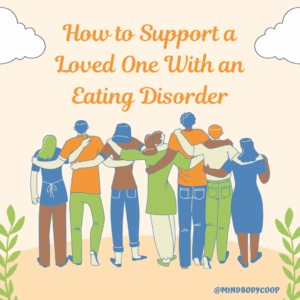Support a Loved One With an Eating Disorder
 For folks recovering from disordered eating or an eating disorder, a support system can be extremely impactful to recovery. If your loved one has an eating disorder, you may be part of their support system. Treatment is only one part of recovery, but most people spend more time with their support system than with their clinicians who are providing care.
For folks recovering from disordered eating or an eating disorder, a support system can be extremely impactful to recovery. If your loved one has an eating disorder, you may be part of their support system. Treatment is only one part of recovery, but most people spend more time with their support system than with their clinicians who are providing care.
There are many different ways to show your loved one support on their journey through eating disorder recovery—whether it be lending a listening ear, going grocery shopping, or recognizing red flags that others may miss.
Eating disorders are complex, and everyone presents differently. There is a learning curve when it comes to what to say and do. Please remember that this may be new to you, and if you make mistakes, it is okay. Know that things that may seem easy or no big deal to you can be extremely upsetting to someone with an eating disorder. Comments like “just eat” minimize the person’s feelings and are invalidating.
Instead, it can be helpful to focus on emotions rather than actions and behaviors. For example, instead of saying “just eat,” you could say, “What feelings are coming up for you right now? Is there anything I can do to help?” Communication is the best way to prevent causing harm and shows you care.
Ways to Support Your Loved One
1. Do Not Talk About Weight or Bodies
Whether it’s someone else’s weight, your own weight, or someone else completely, leave this topic out of the conversation. Even if the comment may be intended to be positive, it can still be harmful because it can either validate an eating disorder or make someone feel bad about the progress they’ve made in recovery.
This is a good rule of thumb to follow in general when talking to anyone (including yourself). Our culture puts an incredible amount of value on physical appearances and body type, which can minimize the other amazing qualities we each have as individuals. Avoiding discussion of weight and bodies is a great way to combat diet culture and help support a healthier society.
2. Do Not Talk About Eating Habits
It doesn’t matter whose eating habits are being commented on—don’t mention it. For someone with an eating disorder, eating in front of others can be a challenge. Commenting on eating habits can increase their self-consciousness and cause them to fall back into behaviors.
3. Minimize Food Talk
Although some food talk is normal (for example, discussing what you think of a meal or if you enjoy the flavors), food talk can be triggering for someone with an eating disorder. It is already most likely difficult for them to sit down and eat a meal, and food talk just calls more attention to a situation they are already uncomfortable being in.
Instead, talk about other topics such as shows you’re watching, plans you’ve made, work, or school.
One thing that can be extremely helpful for both you and your loved one is to ask them to make a list of topics they would like to discuss and a list of topics to avoid. This way, you can be aware if something is triggering without them having to tell you verbally, which can be difficult.
4. Ask Them What You Can Do to Help
Everyone has different needs and ideas of what they find helpful. The only way you can know the best way to provide support is by asking. Some good questions to ask are:
- What should I say when you succeed?
Some people like to have their success acknowledged with words of affirmation. Others may like a sticker chart or a reward system. Some people do not want their successes acknowledged outwardly and may prefer you say nothing at all. - What should I say when you reach a roadblock?
Unfortunately, not every challenge will be successfully executed. Sometimes we encounter roadblocks and have to dust ourselves off and try again. Offering your support when a loved one encounters roadblocks might be when they need you most. This support may look like words of affirmation and reassurance. Some people might just want someone to listen or even just sit with them. - What are some warning signs that you might need more support?
Recognizing red flags can be key to stopping someone from backsliding in recovery. Ask your loved one what are signs they may be relapsing. Is it that they are eating alone more often? Exercising more? Avoiding certain foods? By asking, you can be on the lookout and hopefully take action before it gets worse.
Getting Help
If you have a loved one who is struggling with an eating disorder or disordered thoughts and is not yet in treatment, please get them help. There is no such thing as not being “sick enough.”
Eating disorders are treated with a combination of therapy, nutrition education and therapy, and medical care.

